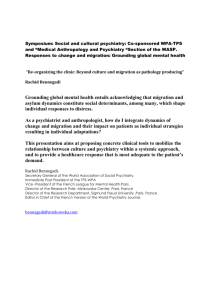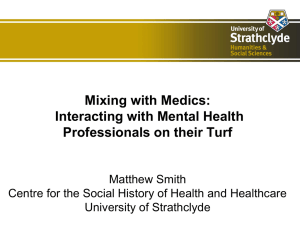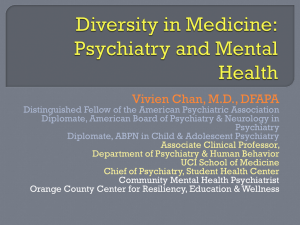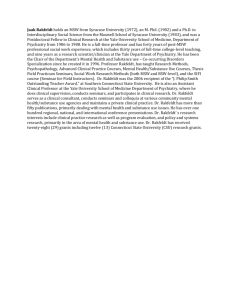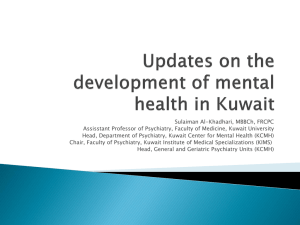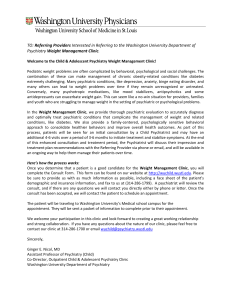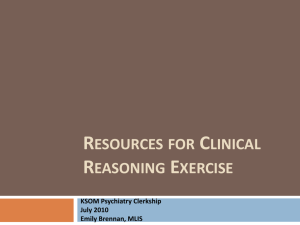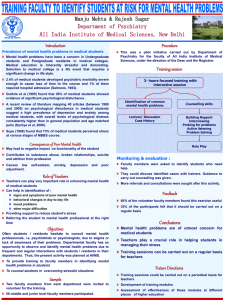Transcultural Psychiatry Symposium
advertisement
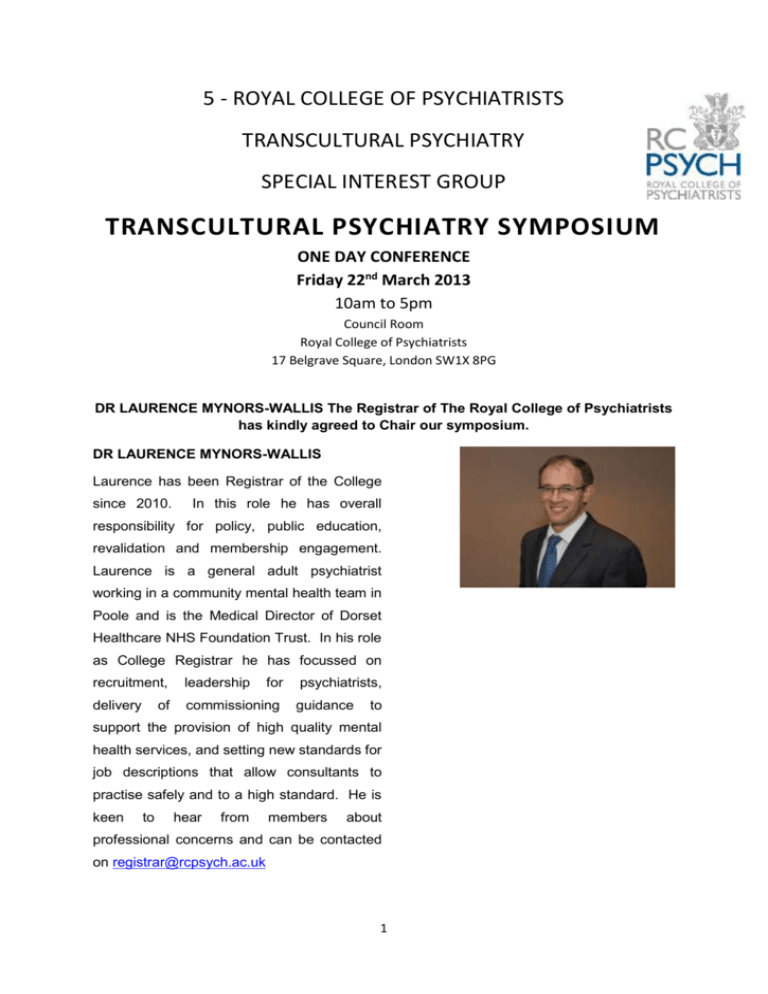
5 - ROYAL COLLEGE OF PSYCHIATRISTS TRANSCULTURAL PSYCHIATRY SPECIAL INTEREST GROUP TRANSCULTURAL PSYCHIATRY SYMPOSIUM ONE DAY CONFERENCE Friday 22nd March 2013 10am to 5pm Council Room Royal College of Psychiatrists 17 Belgrave Square, London SW1X 8PG DR LAURENCE MYNORS-WALLIS The Registrar of The Royal College of Psychiatrists has kindly agreed to Chair our symposium. DR LAURENCE MYNORS-WALLIS Laurence has been Registrar of the College since 2010. In this role he has overall responsibility for policy, public education, revalidation and membership engagement. Laurence is a general adult psychiatrist working in a community mental health team in Poole and is the Medical Director of Dorset Healthcare NHS Foundation Trust. In his role as College Registrar he has focussed on recruitment, leadership delivery commissioning of for psychiatrists, guidance to support the provision of high quality mental health services, and setting new standards for job descriptions that allow consultants to practise safely and to a high standard. He is keen to hear from members about professional concerns and can be contacted on registrar@rcpsych.ac.uk 1 SPEAKERS: 1. Transcultural Psychiatry in the 21st Century Dr Hellme Najim, Basildon Essex, United Kingdom. Graduated from Mosul Medical College 1977. Membership of the Royal College of Psychiatrists 1983. Assistant Professor of Neuropsychiatry Mosul University Iraq 1989 - 93. Assistant Professor in Neuropsychiatry Sana'a University Yemen 1993 94 Lecturer at The Institute of Psychiatry London 1996-8 Consultant Psychiatrist South Essex University Foundation Trust 1998 present Special interest:Psychopharmacology, Service provision of people with severe mental illness, Interface between primary and secondary care. He was elected as a chair for the Transcultural Psychiatry Special Interest Group at the Royal College of Psychiatry in July 2012. Transcultural psychiatry deals with psychiatric disorders and services in different cultures and how cultural systems and beliefs influence psychiatric presentations and response to treatment. The revolution in transport and communication has led to more interaction and mobilization of people across the countries and continents. The global village concept has developed which made people more aware of different nations and customs much more than before. Conflicts and unrest has displaced people from their countries. They settled in their hosting countries and exposed them to different cultures and enriched the hosting cultures with their traditions. Economic immigration has made people move from there home countries searching for a better life. Usually people move from low income to high income countries. Immigration has been proved to be stressful and immigrants have high 2 psychiatric morbidity internationally. Psychiatrists practicing in hosting countries started to encounter presentations they haven’t studied or come across before. Transcultural Psychiatry jumped from the shelves of libraries to day to day practice, especially in the West where waves of immigration have rippled on their streets. The Royal College of Psychiatrists, as an academic institution, has always paved the way for psychiatric training, research practice in the United Kingdom and worldwide. Transcultural Psychiatry special interest group is the relevant venue to lead the way in this field. In order to achieve this objective, our plan is to organise regular meetings and symposia about psychiatry in different parts and to publish our electronic news letter regularly. We will create an electronic forum to discuss transcultural issues and update news worldwide. We will try to liaise with other special interest groups at the Royal College and create channels of communications with ethnic minorities in the United Kingdom. We will also liaise with self-help groups and different cultural organisations, through attending their activities or inviting them to our activities. All these objectives cannot be achieved without your help and support. 2. Transcultural Linguistic Intricacies of Expression of Depression Dr.Archie Acharyya Graduated from India. Worked in Psychiatry in India. Worked and trained at the Institute of Psychiatry for many years. Has been a Consultant Psychiatrist for 25 years in Essex. Medical Director for many years in Essex. He contributed a chapter in the volume "Intercultural Psychiatry" edited by Late Jafar Kareem & Prof.Rowland Littlewood. He was a co-founder of Nafsiyat Intercultural Therapy Centre with Late Jafar Kareem. He writes poetry. His main interest is Transcultural Psychiatry and philosophy. Title: "Verbal language and Expression of Affect - Intercultural understanding between Psychiatrists and Patients - a Jobbing Psychiatrist's Dilemma! 3 Although the world has been "multicultural" for several millennia, now, in our small island nation, psychiatrists -multicultural, are seeing patients who are multicultural. Given the present state of the NHS (not to mention the national and international economies - in hock to the capitalists), it is not possible (except, perhaps, in very few, very select, centres of superexcellence), for patients to be exactly -matched with psychiatrists in terms of their culture, down to the microcosmic aspects. So, the question an ordinary jobbing psychiatrist is asking is this: - we have been researching fairly extensively, for at least the last two decades, schizophrenia, from a transcultural perspective, across the world and amongst native and immigrant populations in particular countries. This has been extensively discussed and is being discussed. Yet, schizophrenia is such a rare condition - as epidemiologists will readily advise us! Affective Disorders of all kind, far, far outnumber schizophrenia in all countries across the world. In the British Isles, given the multicultural profile of psychiatrists, the multicultural profile of their prospective patients, how well do psychiatrists understand their patients' emotions and emotional tones, expressed in words? How much of the psychiatrists' questions and advice is fully comprehended by their patients - given that, in so many cases, English is neither the patient's nor the psychiatrist's first language? This is the jobbing psychiatrist's dilemma - how am I doing with my multicultural patients? How can I do better? Please advise?" 3. Transcultural Models of Cognitive Behaviour Therapy Dr Farooq Naeem In addition to specialist qualifications in psychiatry: Masters degree in research methodology and a PhD. Published more than 60 publications in journals, in few books and in book chapters. Main areas of interest in research include transcultural psychiatry, psychosocial interventions and genetics of mental health disorders. 4 Ran many projects in both the UK and Pakistan. Has been part of funded research projects and has collaborated with Durham, Manchester and Toronto University’s. Developed culturally adapted CBT for local clients in Pakistan and ethnic minority clients in the UK. Founding President, Pakistan Association of Cognitive Therapists (www.pactorganization.com) Cognitive Behaviour has a strong evidence base and is recommended by National Organizations in both the UK and USA. There is some evidence from research to suggest that CBT might need some adaptations when working with clients from non European background. Most research on this area originates from the US. Developing culturally sensitive CBT project at Southampton University involved adaptation of CBT for black and ethnic minority communities in UK and for local population in Pakistan. A series of mixed method studies were conducted in Pakistan and in UK. We adapted CBT for depression and psychosis in Pakistan, while in the UK CBT was adapted for psychosis. Based on this work guidelines were developed for adapting CBT. These were further adapted during our work in Manchester and Pakistan. We will describe the guiding principles for working with South Asian Muslims (SAM), using CBT, which emerged from our work. We found that in order to effectively work with clients from SAM background, therapists need to consider and develop three fundamental areas of cultural competence; (1) Awareness of relevant cultural issues and preparation for therapy; (2) Assessment and engagement and, (3) Adjustments in therapy techniques. Awareness of cultural issues in turn includes awareness of cultural and religious issues, capacity and circumstances of both the individual and the system and cognitions and beliefs. Overall, findings from, developing culturally sensitive CBT project suggest that minor adjustments in therapy are required in order to work with SAM clients. However, further work is required in this field. The aim of this presentation is to describe guidelines which emerged from our work on developing culturally sensitive CBT with SAM. 4. My Adventures with Doctors from Many Lands Dr.Chris Fasey 5 Born 1958, qualified in medicine 1981, MRCPsych 1987, FRCPsych 2006, MBA 2007. Appointed Consultant in Psychiatry of Old Age at Basildon Hospital 1994 to present including a time as Clinical Director of Old Age Services. Recognised Senior Registrar trainer from late 1990s. Joint director East London and South Essex SpR training rotation 20042008. Worked part-time from 1997 with the birth of 1st son and is currently working 4 ½ days/week. Due to retire 30/06/13 at age of 55. The future is unplanned but decidedly less onerous. When I was asked to do a presentation on my experiences with junior doctors I was put in a quandary. Over the last 19 years I have worked with many doctors, from many parts of the world and of many religions. I am not aware, however, of making any special allowance or altering my practice – they were all junior doctors seeking to understand, at some level, the vagaries of old age psychiatry and develop skills to help with their future practice and their exams. - This task has forced me to reflect on my work with juniors How one deals with the cultural differences and expectations The differences in ethical problems – how much are these individual and how much cultural Differences in language given the nuances in English vary so wildly Navigating the cultural differences within modern English society, which are as often class based, and ethics. This presentation is the product of my reflections………………. 5. Attitudes Towards Mental Health of Women in a Pakistani Community in UK Dr Rashda Tbassum 6 Medical Degree from Pakistan. Moved to UK in 1993. Completed MPhil from Sheffield Hallam University Sheffield in 1997 it was about the attitudes of Pakistanis towards the mental health of Pakistani women. Joined Psychiatry Training scheme as a part-time SHO. Became a member of Royal college of Psychiatrist in 2006. Worked as an Associate Specialist in Old Age Psychiatry since 2005. Transcultural psychiatry is one of her special interest and her latest research about the “use of translated version of MMSE with south Asian elderly patients in the UK” was published In INTERNATIONAL PSYCHIATRY in April 2010. It led to the production of DVDs in two south Asian languages for raising dementia awareness in BME community. These DVDs are also being considered for use as a training tool. British Pakistanis make up the second largest subgroup of British Asians and are also the second largest ethnic minority population in the United Kingdom. Pakistani immigration to the United Kingdom increased, especially during the 1950s and 1960s.The prevalence of mental disorder in immigrant groups in the United Kingdom has received considerable attention in the research literature over many decades although findings have been inconclusive. The present study was designed to explore some of the apparent contradictions in research literature. There have been few studies in the UK looking specifically at the attitudes towards mental illness in Pakistani community and the possible attributional factors contributing to these attitudes. The second aim was to explore the needs of this community, particularly women, in relation to mental health services 6. Transcultural Interpretation of Depressive Presentation Dr.Shahid Latif 7 Consultant psychiatrist and clinical director at Northamptonshire healthcare NHS foundation trust. Trained in Leicester which has a richly populated Asian community. Developed an interest in transcultural psychiatry while working there. Special interest in cultural and religious beliefs in possession states and black magic; he works closely with the local community and religious leaders in attempting to provide education into mental health problems. My talk will focus on the importance of understanding the background and belief systems of the patients that we see particularly from different ethnic backgrounds. Also a little bit about my qualitative study on Muslims Beliefs in black magic, evil eye and possession states. The talk focuses on the cultural barriers that may effect meaningful therapeutic bridges. This may lead to under recognition or misidentification of psychological distress. Thus unnecessary diagnostic procedures or inappropriate treatment. It is important to decode the meaning of somatic and dissociative symptoms which are not simply indices of disease or disorder but part of a language of distress with interpersonal and wider social meanings'. 7. PTSD and the Military: Is the Army a Culture Bound Syndrome? Professor Sir Simon Wessely MA BM BCh MSc MD FRCP FRCPsych FMedSci FKC 8 Professor and Head of the Department of Psychological Medicine and Vice Dean for Academic Psychiatry at the Institute of Psychiatry (IoP), King’s College London. Best known for his work on unexplained symptoms, syndromes and military health. Founded the King’s Centre for Military Health Research, a unique collaboration between the IoP and the KCL Department of War Studies, founded in 2003. Its flagship project, a large-scale ongoing study of the health and wellbeing of the UK Armed Forces, has had a direct impact on public policy and on forms of treatment and help for Service personnel. Born and educated in Sheffield Studied medical sciences and history of art at Trinity Hall, Cambridge Finished his medical training at University College Oxford, graduating in 1981. He obtained his medical membership in Newcastle, before moving to London to train in psychiatry, where he also obtained a Master’s and Doctorate in Epidemiology. Consultant Liaison Psychiatrist at King’s College Hospital and the Maudsley Hospital since 1991. Director of the Chronic Fatigue Research Unit at King’s in 1994 and of the Gulf War Illness Research Unit in 1996. Civilian Consultant Advisor in Psychiatry to the British Army Member of the Defence Scientific Advisory Council Foundation Senior Investigator of the National Institute for Health Research. Professor Wessely has over 650 original publications, with a particular emphasis on the boundaries of medicine and psychiatry, unexplained symptoms and syndromes, military health, population reactions to adversity, epidemiology, history and other fields. He has co authored a text book on chronic fatigue syndrome, a history of military psychiatry and a book on randomised controlled trials, although none are best sellers.. He is a trustee of Combat Stress, and his contributions to veterans’ charities include cycling (slowly) six times to Paris to raise funds for the Royal British Legion. 9 In 2012 he was awarded the first Nature “John Maddox Prize” for Standing Up for Science, and was knighted in the 2013 New Year’s Honours List. Professor Simon Wessely has kindly agreed to talk about: 8. Psychiatric Practice in India – A Comparison with the Western Model Prof Sab Bhaumik Prof Sab Bhaumik is currently Honorary Chair of University of Leicester, Medical Director of Leicestershire Partnership NHS Trust Royal College of Psychiatrists’ lead for primary mental health care. Former Chair of Faculty of Psychiatry of Learning Disability Chair of Trent Division of RCPsych. Awarded OBE for services to Medicine in 2006 Winner of the Hospital Doctor Award in 2005. Current lead for next stage review programme for Learning Disability in East Midlands Chair of the Working Group on Development of Care Pathways. Published extensively in health service research and is currently leading on a research project on implementation of care pathways in learning disability. India is a continent; health care in India is a reflection of its large population. 10 OUTCOME AND FEEDBACK 35 colleagues registered for the symposium. 22 feedback forms were returned. Most of the feedback was excellent and very good. We received a few emails in addition to feedback forms. Please see Correspondence to view a sample for authenticity and for the benefit of colleagues who may consider attending future activities. 11
